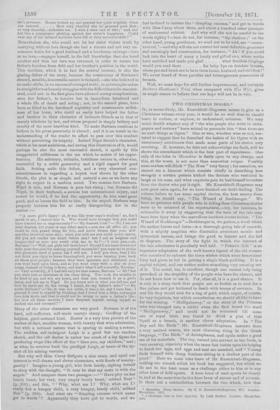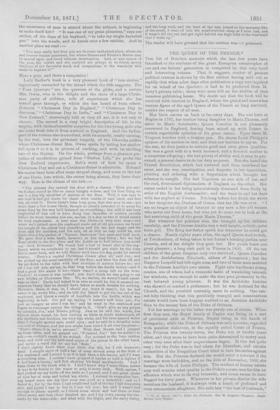TWO CHRISTMAS BOOKS.*
Ir, as seems likely, Mr. Knatchbull-Hugessen means to give ua a Christmas volume every year, it would be as well that he should learn to endure, or anyhow, to understand, criticism. We very much cloublt whether any of "the wise people who write in news- papers and reviews" have wished to persuade him " that there are no such things as Ogres." One or two, whether wise or not, ven- tured to suggest that he described the habits of his Ogres with an unnecessary minuteness that made some parts of his stories very revolting. If, however,, be dohs not acknowledge hie fault, still he shows the amendment which is the best part of repentance. One only of the tales in Moonshine is fairly open to auy charge, stud this, at the worst, is not more than somewhat vulgar. Possibly some readers will think " The Nose " very funny ; for ourselves, we cannot see a humour which consists chiefly in describing how savagely a certain patient kicked the doctors who ventured to laugh at his nose, and what exquisite pain he had himself to endure from the doctor who put it right. Mr. Knatchbull-Hugessen may now grow calm again, for we have finished our fault-finding. The volume before us has some capital stories, the best among them being, we should say, " The. Wizard of Bockhanger." We have no patience with people who in telling these Christmas stories seem to be ashamed of the supernatural,—try, for instance, to rationalize it away by suggesting that the hero of the tale may have been tipsy when the marvellous incident occurs to him. "The Wizard of &Alta ager"—Bockhauger is, we gather, a wood which the author knows and loves—is a thorough-going tale of marvels, with a mighty magician who discomfits avaricious monks and tyrannical barons, and brings the good to honour and the bad to disgrace. The story of the fight in which the interest of the tale culminates is peculiarly well told. " Potter's Gift " is an ingenious adaptation of the well-known legend of the old woman who contrived to exhaust the three wishes which some benevolent fairy had given to her in getting a single black-pudding. It is a capital subject, and our author makes something very amusing out of it. The moral, too, is excellent, though one cannot help being provoked at the stupidity of the people who have the chance, and do not know how to use it. For, after all, it is a good chance. It is only its a story-book that people are so foolish as to wish for a fine palace and get bothered to death with troops of servants. Iu real life they would wish for a bag of gold, which might, of course, be very injurious, but which nevertheless we should alllike to have for the wishing. "Mulligatawny," or the story of the Princess who was changed into a rabbit when she first heard the word " Mulligatawny," and could not be recovered till some one of royal birth was found to drink a pint of that liquid at a breath, is another clever adaptation. In " The Boy and the Birds " Mr. Knatchbull-Hugessen borrows from a very ancient source, the most charming thing in the Greek language, " The Birds " of Aristophanes, and again makes a good me of his materials. The boy, turned into servant to the birds, is very amusing, especially when the moor-hen insists upon his helping to hatch her eggs, and eggs and nest are smashed, and " Tommy finds himself with damp feathers sitting in a shallow part of the pond." Here we must take leave of Mr. Knatchbull-Hugessen, making one remark which his book has suggested, but which we do not in the least mean as a challenge either to him or to any other lover of field-sports. A keen lover of such sports he clearly is, and at the same time he is a keen lover of nature and of animals. Is there not a contradiction between the two which, now that Moonshine. Fairy Stories. By E. II. Ematchbull-Hugossen, MI'. London : Macmillan. 1871.
* A Christmas Cake in Pour quarters. By Lady Barker. London: Macmillan. 1871.
the conscience of men is stirred about the subject, is beginning to make itself felt? " It was one of my great pleasures," says our author, of the days of his boyhood, " to take my single-barrelled gun " into the woods, and to knock over a few rabbits. And in another place we read :-
" Yon may easily fool that you are in Boma enchanted place, where sin and sorrow cannot penetrate, but where Nature and Nature's Master may 1,0 mused upon and loved without interruption. And, at any rooteon of the yrnr, the rabbit and the squirrel are always to be found, merry deniaens of the favourite wood, and companions to the wanderer who seeks to explore it."
Here a prey, and there a companion!
Lady Barker's book is a very pleasant book of " true stories," ingeniously connected by the thread which the title suggests. The "Four Quarters " are the quarters of the globe, and a certain Mrs. Owen, who is the delight and the slave of a large Christ- mas party of children, tells of experiences which she has herself gone through, or which she has heard of from others. Between " Christmas Day in England," " Christmas Day iu Jamaica," " Christmas Day in India," and " Christians Day in New Zealand," charmingly told as they all aro, it is not easy to choose. The second is a very bright description of life in the tropics, with its inexhaustible surprises for the two young girls who are'come fresh into it from a school in England. And the Indian part of the volume also is excellent, with its comedy, nearly turning, by the way, into the grimmest tragedy, of the Uhoorka soldier whose Christmas dinner Mrs. Owen spoils by letting leer shadow fall upoa it as it is in process of cooking, and with its thrilliug tale of the Mutiny. On the whole, perhaps from a pleasant pre- judice of recollection gained from "Statioa Life," we prefer the New Zealand experiences. Bob's story of how he spent a
Christmas Day and eat a Christmas dinner is admirable. Bob and his mates have been after some strayed sheep, and come to the but of one Davis, into which, the owner being absent, they force their way. Here is the climax of the tale :-
" The minute Joe opened the door with a cheery ' Here you are,' we looked round us like so many hungry wolvoe, and the first thing we sou is a line big shoulder of mutton on the floor. Well, it was easy to sec how it had got there, for there were marks of rats' tooth, and feet too, all over it. Davis hadn't been lung gone, that was easy to SOB—not more than a few hours likely, though he plainly intended to be away for some time by the way he'd fastened up everything; but still it was very neglectful of him not to have flung that shoulder of mutton outside before lie went, because you see, ma'am, in a day or two it would surely be very unpleasant. A nest man was Davis—a very neat man—lied when we'd prized open his cupboard made out of old gin-cases, we found his couple of tin•plates'and pannikine, and his tea and sugar, and his flonr and his matches, and his salt, all as tidy as tidy could be, and there was it big packet of Vermin. Destroyer' too, open and half used. Wo gave that a wide berth, however, as you may fancy ; but we had genie sticks in the fire-place and the kettle on to boil before you could say 'Jack Robinson.' We found half a loaf of broad also in the cup- board, which we concluded to oat, lest it should get stale by the time Davis came back, and wo told Mauro we'd have his flap-jacks for second course. Here's a capital Christmas dinner after all,' said Joe ; and he picked up the meat carefully off the floor, and blow the dust off, and we sat down to the table with that shoulder of mutton before us; and all I can toll you, ma'am, is, that long before the kettle boiled—and it had a good fire under it too—there wasn't a scrap loft on the bone, Cooked! in course it was cooked ; you don't think we was going to eat raw wittlos on Christmas Day. No, no, ma'am, wo weren't such canni- bals as that I Davie had baked it as nice as could be, but it seemed un- common funny that he should have taken so much trouble for nothing. However, there, it was, or, I elreuld say, there it wasn't, for we had eaten it up, every bite; and wo told Joe Smelt to got the tea out of the cupboard, and throw a couple of handfuls into the kettle, which was beginning to boil. Joe got up, saying, havon't half done yet; I'm just as hungry as ever I can be;' and ho went to the cupboard and began to rummage among the things in it. 'Don't give us any, poison by mistake, Joe,' said Munro, joking. Just as he said the words, Joe turned abort round, his face looking as white as death underneath all the sunburn and freckles, his very lips white, and his eyes opened wider than I thought mortal eyes could open ; and ho said in a dreadful voice a sort of whisper, and yet you might have heard it all over the place- ' That's where it is, we're pisoned!' With that Munro and I jumped up from table, and we gasped out, 'Poisoned, Joe !' but we needn't to ask—we couldn't speak if we wished. Joo pointed to the bare mutton bone, and hold out the half-used paper of the poison in the other hand, and never a word did lie say but 'Rats' I don't rightly know whet poor little Joo did, for I felt desperate mad. I caught eight of half a bar of soap stowed away at the back of tie cupboard, and I seized it as if it had been a life-bunny, and I'd been a drowning man. I couldn't have gripped it harder or held it tighter if it had boon a bucuy,' said Bob, shirking his head meditatively. And I runs down to the creek with it. I don't know why I went there, unless it wits to be handy to the water to gulp it down with. Well, ma'am, I had picked up my knife off the table as I passed, and I out groat junks of that bar of soap, and bolted 'em whole. I seemed to remember hav- ing heard some one say that coop was good as a hemotlek and no I found it ; for by the time I had swallowed half of the bar I felt desperate sick, and joyful I was to fool it, I can tell you ; but still I wasn't bad enough to please myself, so I drank some water and had three or four allees more, and that about finished me, and I lay down among the tee- Books by the water-side; and what with the fright, and the early rising, and the long walk, and the heat of the sun, joined to the murmur-like of the croak, I went, off into the comfortablest sleep as I ever had, and it wasn't till the sun had got right behind the high hills to the westward that I woke up."
The reader will have guessed that the mutton was net poisoned.











































 Previous page
Previous page